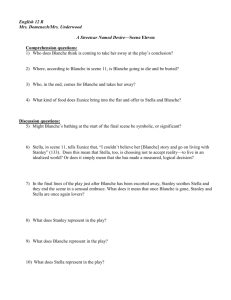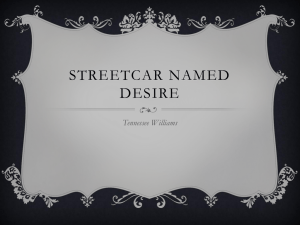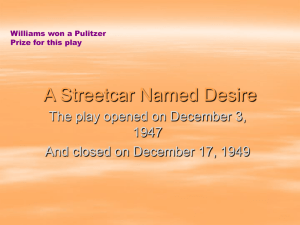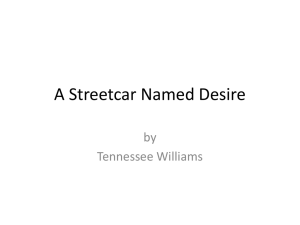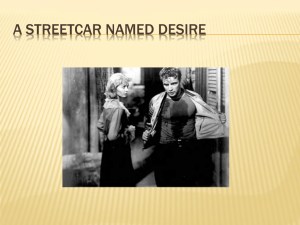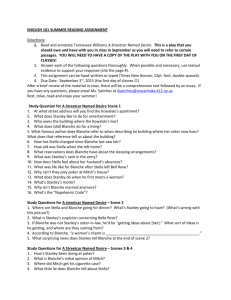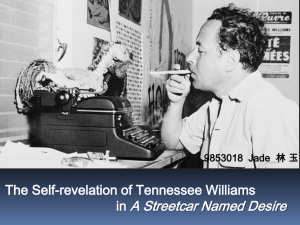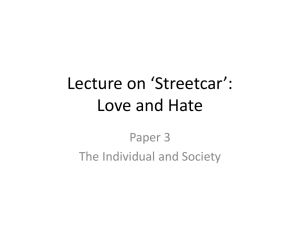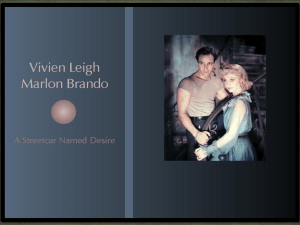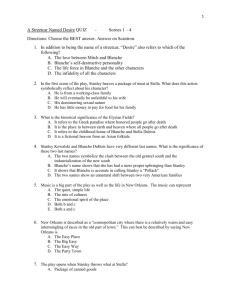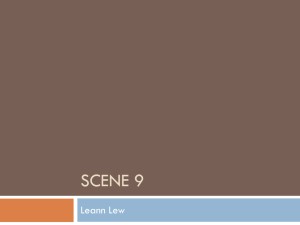Lecture on *Streetcar* Beauty and Brokenness
advertisement
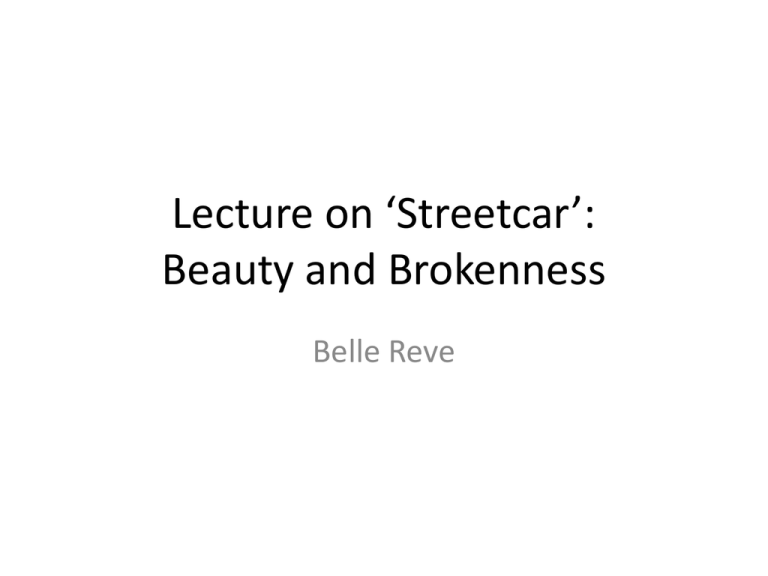
Lecture on ‘Streetcar’: Beauty and Brokenness Belle Reve The Individual and Society Issues; Sources of Conflict • • • • • • • • • • • Gentle Man and Brutish Man Ladies and Women of Easy Virtue Societal representations of Sexual Promiscuity Adultery; Homosexuality Love and Marriage Hard and Soft People; Strength and Weakness; the Strong and the Weak (Lambs and Birds of Prey) Good and Evil Civilization and the Caveman The Smart and the Stupid Racial Prejudice and Discrimination Suicide Epigraph ‘And so it was I entered the broken world’ from the poem, The Broken Tower by Hart Crane Character Focus and Point of View Point of View — in Drama? • Character Perspective; • Privileging of one character’s perspective; • Blanche is the central focus of our attention; • Blanche commands audience attention through her arresting language, actions, and gestures; • We notice and note Blanche, as a stage character, is the central focus of virtually every scene; • And virtually ‘signs off’ on every scene; Key Concepts in Context • Concerns: [ Point of View ] What is Beauty? What is Brokenness? Broken Beauty; Crushed Beauty ‘Frailty, thy name is woman.’ Methods / Techniques • How are these thematic concepts presented? Dramatic Techniques, and Dramatic Effects; • Seeing Patterns and making Connections with ‘Othello’ Williams writing in the stage directions of The Glass Menagerie • ‘When you look at a piece of delicately spun glass, you think of two things: • How beautiful it is and how easily it can be broken.’ Paradox • (It can be argued) that nearly everything in Williams’ plays is focused on • The Theme of: Beauty and Brokenness Concept of Beauty The beautiful? • Love, Romance, Humanity; Art (literature, poetry and music), Civilization; Culture (haute couture); Courtly Chivalry; the Glories of the Past; Nature Past Selves of Blanche & Stella • But will always somehow remain out of reach, Or • If elements of the beautiful are briefly achieved • they will inevitably always be smashed; • ‘Stanley’s always smashed things’ Scene 4 p36 Art: Blanche to Stella in Scene 4, p41 • God! Maybe we are a long way from being made in God’s image, but Stella—my sister—there has been some progress since then! Such things as art—as poetry and music—such kinds of new light have come into the world since then! In some kinds of people some tenderer feelings have had some little beginning! That we have got to make grow! And cling to, and hold out the flag! In this dark march toward whatever it is we’re approaching. . . Don’t—don’t hang back with the brutes! Causes and Effects of Brokenness? • Brutality and Vulgarity of Masculine Humanity and Patriarchal, Bestial, Industrialized, Urbanized Society • Desperation; Desire (Brutal; Sexual); Decisions; Defeat • Hopelessness; Failure • Fragility; Vulnerability (Suffering; Trembling) • Fragile sense of reality; Stanley’s ripping up dreams; • Decline; the crumbling grandeur of Southern Plantations • Destruction of traditional old Southern values; • Self-destruction; Broken Spirit; Mental Breakdown / Madness Fragility: Blanche in Scene 5 p45 • I never was hard or self-sufficient enough. When people are soft—soft people have got to court the favour of hard ones, Stella. Have got to be seductive—put on soft colours, the colours of butterfly wings, and glow— make a little—temporary magic just in order to pay for—one night’s shelter! An observation re Incubation period of Destruction • Williams’ macho, male characters do not straight away set about ripping up and destroying dreams; smashing their fragile sense of reality; • Rather they are usually provoked into a violent reaction; • By someone perceived as an intellectual superior; • A crepe-de-chine wearing outsider like Blanche who cannot help belittling someone like Stanley notably in Scene 4 and throughout the play; • Leading to an emotional dance of death; a ‘DANSE MACABRE’ In Williams’ World • In Williams’ world, intelligence, intellectual sophistication amongst male characters • Is the province of the ‘degenerate’; of Queers and Queens (like Allen Grey) • Straight, tough, macho males have other more down-to-earth manly qualities to offer; • Like being able to punch some guy’s lights out if he is getting fresh with his squeeze; • Or sorting out the plumbing in your bathroom Sexual, not Super-Subtle Southerner Blanche, you saw him at his worst last night. On the contrary, I saw him at his best! What such a man has to offer is animal force and he gave a wonderful exhibition of that!— But the only way to live with such a man is to— go to bed with him! And that’s your job—not mine! [Scene 4 p39] Eunice about men in Scene 11 p82 • I always did say that men are callous things with no feelings, but this does beat anything. Making pigs of yourselves. Othello in Act 1, Scene 3 Othello • Upon this hint I spake: She lov’d me for the dangers I had passed, And I loved her that she did pity them. This only is the witchcraft I have used: Here comes the lady. Let her witness it. Destructive Gossip see p45 Scene 5 • Blanche is undone in part by the malicious, destructive gossip Stanley spreads about her; • He tells Mitch about all the men she has slept with, and how she was suspended from her teaching of English in high school in Laurel; • She is as a result perceived as cheap goods; (Southern Belle, Blanche, as ‘Broken’ goods) • Mitch is thus Blanche’s last hope of escaping the Kowalskis and living a respectable life The Beauty of the Glories of the Past • And you’re from Mississippi? • She showed me a picture of your home-place, the plantation; • Belle Reve; ‘A great big place with white columns.’ • ‘Belle Reve? Lost, is it? No!’ p12 • We hear the music of the Blue Piano that expresses the spirit of life which goes on here grow louder upon this revelation. Blanche to Stella Scene 4 p39/40 • I take for granted that you still have sufficient memories of Belle Reve to find this place and these poker players impossible to live with. • You can’t have forgotten that much of our bringing up, Stella • But there are things that happen between a man and woman in the dark… • What you are talking about is brutal desire Note 6 in Methuen Edition p93 • Belle Reve: the DuBois family home is an impressive plantation house architecturally defined by its ‘white columns’. Belle Reve will remain a picture or idea throughout the play, a symbol of privileged existence that has been forcibly relinquished, a way of life that has been superseded. • The house is a fantasy, a version of the Old South that was never quite true. Literary Allusion to Poe • She looks at a slip of paper, then at the building; her expression is of shocked disbelief. Her delicate beauty must avoid a strong light. • Oh, I’m not going to be hypocritical, I’m going to be honestly critical about it! Never, never, never in my worst dreams could I picture— Only Poe! Only Mr. Edgar Allan Poe!—could do it justice! Out there I suppose is the ghoul-haunted woodland of Weir! • Note Blanche’s poetic imagination [Scene 1 p8] Beauty: Glories of the Past, Scene 3 Nature, Culture, and Civilization • ‘Miss DuBois? • It’s a French name. it means woods and Blanche means white, so the two mean white woods. Like an orchard in spring! • You’re French? • We are French by extraction. Our first American ancestors were French Huguenots. ‘ [p30] Brabantio: ‘This is Venice.’ Implied contrast of stereotypes of Polish descent? Blanche and Mitch in Scene 6 p52 Blanche and her fantasy world • We are going to be very Bohemian. We are going to pretend that we are sitting in a little artists’ café on the Left Bank in Paris! < She lights a candle stub and puts it in a bottle> • Je suis la Dame aux Camellias! Vous etres—Armand! Understand French? • Naw. Naw, I— • Voulez-vous couchez avec moi ce soir? Literary Heritage Scene 3 p31 • Blanche alludes to literary giants of American literature— Hawthorne, Whitman, and Poe Blanche remarks • ‘Their literary heritage is not what most of them treasure above all else!’ A Beautiful Mind, Spirit and Heart Blanche to Stanley in Scene 10 p78 • A cultivated woman, a woman of intelligence and breeding, can enrich a man’s life— immeasurably! I have those things to offer, and this doesn’t take them away. Physical beauty is passing. A transitory possession. But beauty of the mind and richness of the spirit and tenderness of the heart—and I have all of those things—aren’t taken away, but grow! Increase with the years! How strange that I should be called a destitute woman! Stella to Stanley about the first Marriage of Blanche to Allen Grey • She married a boy who wrote poetry…. He was extremely good-looking. I think Blanche didn’t just love him but worshipped the ground he walked on! Adored him and thought him almost too fine to be human! But then she found out— • This beautiful! And talented young man was a degenerate. [Scene 7, p61-62] Suicide; Self-Destruction; Beauty Broken; Scene 6 p57 Blanche to Mitch • We danced the Varsouviana! Suddenly in the middle of the dance the boy I had married broke away from me and ran out of the casino. A few minutes later—a shot! • Allan! Allan! The Grey boy! He’d stuck the revolver into his mouth, and fired—so that the back of his head had been—blown away. Adultery; the Rape Scene; Scene 10 • Oh! So you want some rough house! • He springs towards her, overturning the table. She cries and strikes at him with the bottle-top but he catches her wrist. • Tiger—tiger! Drop the bottle-top! Drop it! We’ve had this date with each other from the beginning! • She moans. The bottle-top falls. She sinks to her knees. He picks up her inert figure and carries her to the bed. The hot trumpet and drums from the Four Deuces sound loudly. p81 Mental Breakdown; Stage Directions Scene 11 p85 • A Doctor and a Matron have appeared around the corner of the building and climbed the steps to the porch. The gravity of their profession is exaggerated— the unmistakable aura of the state institution with its cynical detachment. • Blanche: Whoever you are—I have always depended on the kindness of strangers. p89 • To Mitch in Scene 3: I need kindness now. p34 Final Observation on the Theme of Beauty and Brokenness • Note the pathetic tension between the characters’ illusions (beautiful dreams) about themselves; • And the crushing disappointments we as an audience know inevitably awaits them. • Stanley: ‘We’ve had this date with each other from the beginning.’
